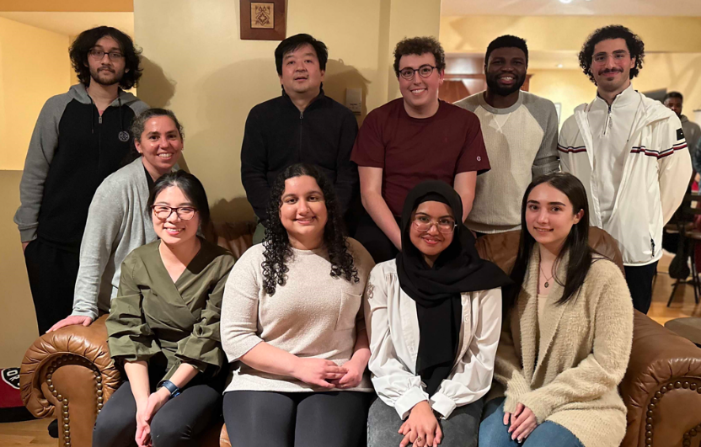Faculty A-Z

Kensuke Hirasawa
Professor of Immunology PhD University of TokyoBioMedical Sciences
709-864-6058 / 709-864-6059
Email:
kensuke@mun.ca
Address:
Division of BioMedical Sciences | Faculty of Medicine
Memorial University of Newfoundland
300 Prince Philip Dr. St. John's, NL CANADA
A1B 3V6
Welcome to the K. Hirasawa Laboratory
Cancer cells accumulate mutations that can increase growth rates and resistance to cell death. Although cancer cells are not all alike, they share certain cellular changes not present in normal cells. Our research goal is to eliminate cancer cells without harming normal cells by targeting these cellular changes specific to cancer cells. One of our projects focuses on oncolytic viruses, which efficiently replicate in cancer cells, but not in normal cells. We investigate what cancer-specific cellular changes support replication of oncolytic viruses in cancer cells. We also investigate the molecular basis for fluorescence detection of cancer cells by protoporphyrin IX, which can be used for fluorescence-guided surgery for tumor removal. Our research goal is to enhance fluorescence detection by modulating cellular changes specific to cancer cells.
Research interests:
Cellular signaling pathways are networks within cells that regulate various cellular processes in response to environmental stimuli. Our current research interests are focused on cellular signaling pathways that are activated during virus infection or cell death. We hope that understanding antiviral and cell death signaling pathways could eventually lead to a new therapeutic approach for treating virus infection and cancer.
Radiotherapy and inflammatory cell death
Radiotherapy is one of the standard cancer therapies which is taken by approximately a half of all cancer patients. Considering that 239K of new cancer cases were estimated to occur in Canada during 2023, an improvement of radiotherapy is important for survival and care of cancer patients. Our research goal is to make cancer cells die “inflammatory” during radiotherapy by modulating cell death signaling pathways in cancer cells. “Inflammatory” death facilitates immune cells to migrate to tumors in the radiation sites and to establish antitumor responses. Once host immune cells are activated and start recognizing tumors, they will destroy tumors which are located distant from the primary site or are invisible. A long-lasting antitumor immunity is essential to prevent cancer recurrences and to promote cancer patient survival.
Promotion of virus replication by programmed cell death pathways
Programmed cell death (PCD) is induced by activation of intracellular death programs, which is commonly observed in virally infected cells. It is generally considered that PCD inhibit virus replication by terminating host cellular machinery and activating antiviral immune responses. The PCD pathways are activated during non-lytic phase of infection (before infected cells die). We have recently found that activated PCD pathways are essential for viruses to complete their replication cycles. We are currently investigating cellular mechanisms underlying the regulation of virus replication by the PCD pathways. This study will provide a new aspect of how host cellular signaling pathways interact with virus replication cycles.
Current lab members:
Maria Licursi (Postdoctoral fellow)
Lingyan Wang (PhD student)
Joseph Duncan (PhD student)
Noah Conohan (PhD student)
Undergraduate students

Publications:
1. Inflammatory cell death induced by 5-Aminolevulinic acid-photodynamic therapy (5-ALA-PDT) initiates anticancer immunity (2023) Wang L, Chelakkot VS, Newhook N, Tucker S, and Hirasawa K# Frontiers Oncology, Oct 2;13:1156763. doi:10.3389/fonc.2023.1156763, https://www.frontiersin.org/journals/oncology/articles/10.3389/fonc.2023.1156763/full
2. Interferon regulatory factor 3 mediates effective antiviral responses to human coronavirus 229E and OC43 infection. (2023) Duncan JKS, Xu D, Licursi M, Joyce MA, Saffran HA, Liu K, Gohda J, Tyrrell DL, Kawaguchi Y, Hirasawa K#. Front Immunol. May 1;14:930086. doi: 10.3389/fimmu.2023.930086. https://www.frontiersin.org/articles/10.3389/fimmu.2023.930086/full
3.Crosstalk between pyroptosis and apoptosis in hepatitis C virus-induced cell death. (2022) Wallace HL, Wang L, Gardner CL, Corkum CP, Grant MD, Hirasawa K, Russell RS. Front Immunology. 13:788138 https://www.frontiersin.org/articles/10.3389/fimmu.2022.788138/full
4. A Novel Small Molecule Inhibits Hepatitis C Virus Propagation in Cell Culture. (2021). Oraby AK, Gardner CL, Needle RF, Kofahi HM, Everard KR, Taylor NGA, Rutihinda SG, Barry JP, Hirasawa K, Georghiou PE, Russell RS. MicrobiolSpectr. 9(1): e0043921 https://journals.asm.org/doi/full/10.1128/spectrum.00439-21?rfr_dat=cr_pub++0pubmed&url_ver=Z39.88-2003&rfr_id=ori%3Arid%3Acrossref.org
5. MEK reduces cancer-specific PpIX accumulation through the RSK-ABCB1 and HIF-1α-FECH axes. (2020) Chelakkot VS, Liu K, Yoshioka E, Saha S, Xu DY, Licursi M, Dorward AM, Hirasawa K#. Sci Rep, 10(1):22124. doi: 10.1038/s41598-020-79144-x. https://www.nature.com/articles/s41598-020-79144-x
6. Systemic MEK inhibition enhances the efficacy of 5-aminolevulinic acid-photodynamic therapy. (2019) Chelakkot VS, Som J, Yoshioka E, Rice CP, Rutihinda SG, Hirasawa K#. Br. J. Cancer, 121(9): 758-767. doi: 10.1038/s41416-019-0586-3. https://www.nature.com/articles/s41416-019-0586-3
7. Mcl-1 and Bcl-xL are essential for survival of the developing nervous system. (2019) Fogarty LC, Flemmer RT, Geizer BA, Licursi M, Karunanithy A, Opferman JT, Hirasawa K, Vanderluit JL. Cell Death Differ. doi: 10.1038/s41418-018-0225-1. https://www.nature.com/articles/s41418-018-0225-1
8. Enhancement of Cancer-Specific Protoporphyrin IX Fluorescence by Targeting Oncogenic Ras/MEK Pathway. Yoshioka E, Chelakkot VS, Licursi M, Rutihinda SG, Som J, Derwish L, King JJ, Pongnopparat T, Mearow K, Larijani M, Dorward AM, Hirasawa K. Theranostics. 2018 Mar 8;8(8):2134-2146. doi: 10.7150/thno.22641. eCollection 2018. https://www.thno.org/v08p2134.htm